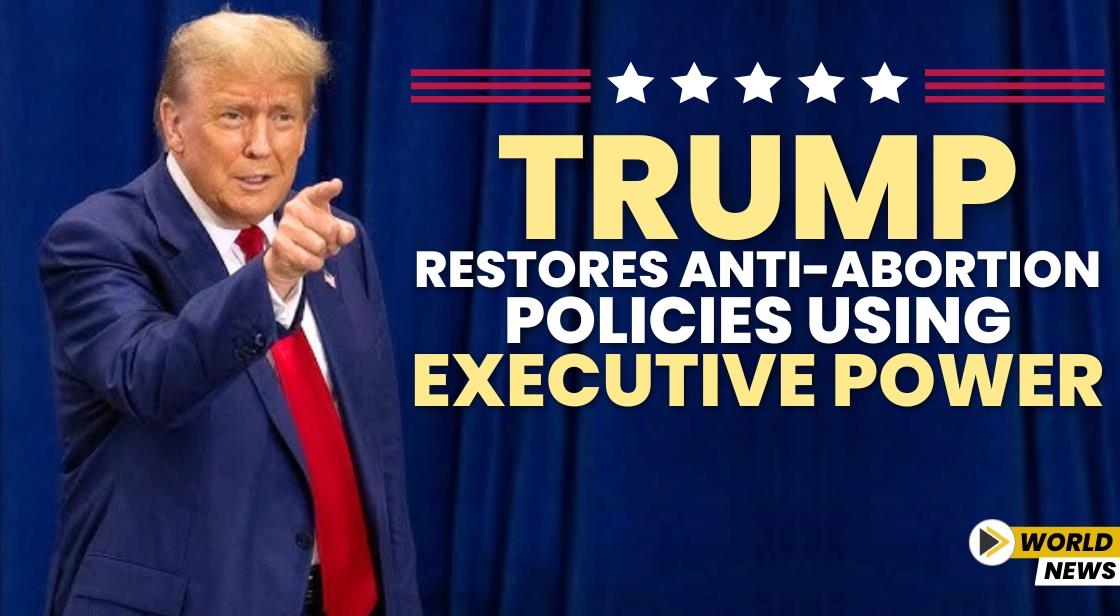Trump Restores Anti-Abortion Policies Using Executive Power

News Synopsis
In a move that has reignited debates over reproductive rights, President Donald Trump on Friday used his executive authority to reinstate U.S. participation in two major international anti-abortion agreements. These policies, including the Mexico City Policy, aim to curtail abortion access by withholding U.S. family planning funds from foreign organizations involved in abortion-related activities.
The Mexico City Policy: A Controversial Measure
Trump’s decision to restore the Mexico City Policy, often referred to by critics as the “global gag rule,” has drawn significant attention. Originally established by former President Ronald Reagan in 1984, the policy has been a political football, rescinded by every Democratic administration and reinstated by subsequent Republican leaders.
Under the policy, foreign organizations that provide or promote abortions are barred from receiving U.S. funding for family planning programs. In his memorandum, Trump stated:
“I am directing Secretary of State Marco Rubio to implement the Mexico City Policy to ensure that U.S. taxpayer dollars do not fund organizations or programs that support or participate in the management of a program of coercive abortion or involuntary sterilization.”
Critics, including Democrats and abortion rights advocates, argue that the policy disrupts access to essential healthcare services and penalizes organizations even if they use non-U.S. funds for abortion-related activities.
Research cited by Janeen Madan Keller, a policy fellow at the Center for Global Development, suggests the policy has led to increased unintended pregnancies and abortions, contrary to its intended goals.
Renewing the Geneva Consensus Declaration
In a further affirmation of his administration’s anti-abortion stance, President Donald Trump announced that the United States would rejoin the Geneva Consensus Declaration. This international agreement, initially co-sponsored by the U.S., Brazil, Uganda, Egypt, Hungary, and Indonesia in 2020, emphasizes preserving human life, strengthening the family unit, and protecting national sovereignty in abortion policies.
Rubio, speaking on behalf of the State Department, highlighted that one of the declaration’s core objectives is to “protect life at all stages.” The pact, now supported by over 35 nations, has faced criticism from reproductive rights advocates who argue that it limits abortion access for millions of women globally.
Executive Order Related to the Hyde Amendment
Trump’s executive actions extended beyond international agreements. He issued an order reinforcing the Hyde Amendment, which prohibits the use of federal funds for abortion coverage in the U.S. He also rescinded two executive orders from his predecessor, Joe Biden, which aimed to safeguard reproductive health services following the Supreme Court’s overturning of Roe v. Wade in 2022.
Organizations like Planned Parenthood expressed concern over these actions. “While this EO (executive order) has no immediate impact, it is an indication of the Trump administration doubling down on denying abortion access to people with low incomes,” the organization said in a statement.
The Larger Context: Abortion in U.S. Politics
The issue of abortion remains deeply divisive in American politics. In 2022, the U.S. Supreme Court’s landmark decision to revoke the nationwide right to abortion transferred the responsibility of abortion laws to individual states. This has created a patchwork of policies, with some states enacting near-total bans and others maintaining robust access.
Trump’s stance on abortion was a focal point of his 2024 presidential campaign, galvanizing his conservative voter base. His recent actions reflect his administration’s commitment to reshaping domestic and global reproductive health policies.
Impact on Global Gender Equality
Reproductive rights advocates warn that these policies could have far-reaching consequences. Janeen Madan Keller remarked: “Broadly speaking, these decisions are going to really set the United States back in advancing gender equality,” highlighting how restricted access to abortion could hinder women’s educational and professional opportunities.
Public-Private Partnerships and Future Implications
While proponents of these policies argue they align with ethical and moral principles, critics emphasize the need for broader public-private partnerships to address global reproductive health challenges. The ongoing debate underscores the importance of striking a balance between moral convictions and the practical implications for public health and gender equality.
Conclusion
President Trump’s reinstatement of the Mexico City Policy and the U.S.’s renewed commitment to the Geneva Consensus Declaration mark a significant shift in both domestic and international reproductive health policies. While these actions have been applauded by anti-abortion advocates, they have drawn sharp criticism from reproductive rights supporters who argue that they hinder healthcare access and undermine gender equality. As the debate continues, the impact of these policies will likely reverberate across the globe, influencing discussions on human rights, public health, and international relations.









